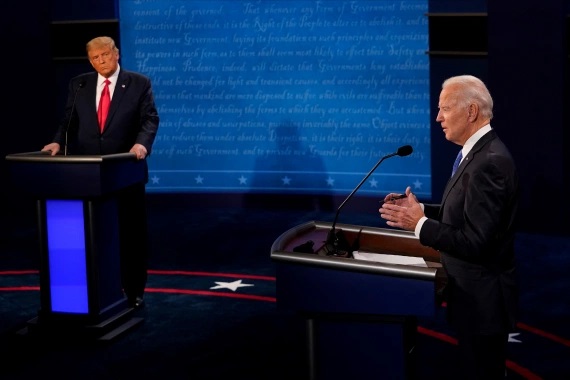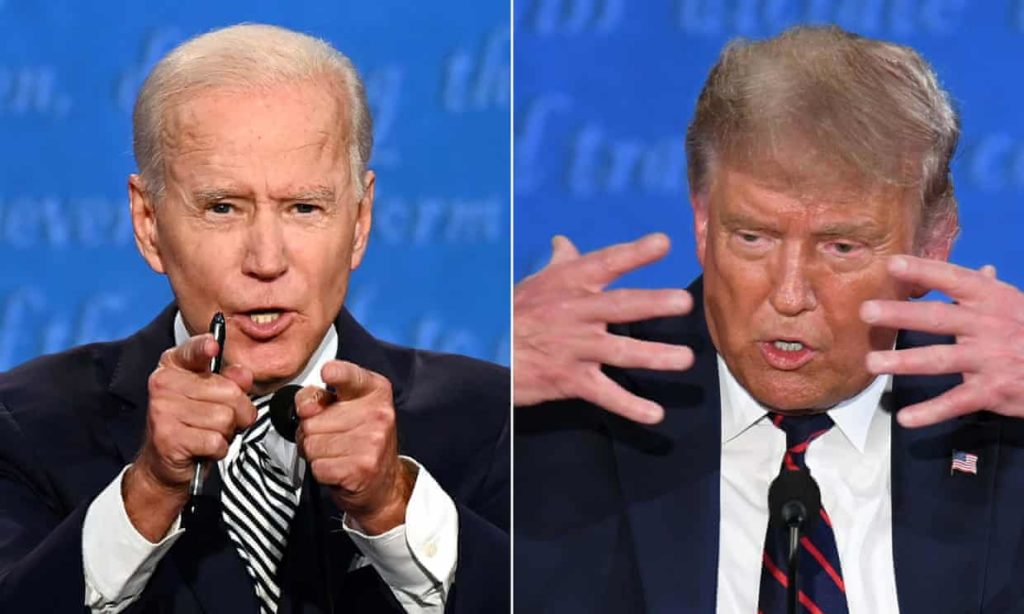
Analysis: A calmer debate offers a closer look at the candidates on a wide range of subjects as the election nears.
From the moment the two septuagenarian leading men stepped onto the stage, the contrast between them leaped off the screen: US President Donald Trump in his trademark red tie, his Democratic challenger Biden in electric blue. Trump maskless, Biden removing a black mask from his face as he strode towards his lectern.
Kristen Welker did an excellent job #Debates2020 https://t.co/3i4oTj5O63
— MephistoFish🗽 (@mephistofish) October 23, 2020
And for the next 90 minutes that sense of contrast persisted, not only stylistically but in the candidates’ approach to the issues that confront the nation. Unlike the previous presidential debate, in which policy discussions were overshadowed by the interplay of personalities, this follow-up encounter allowed for a more serious, at times even thoughtful, tone. Much of this improvement can be attributed to Kristen Welker of broadcaster NBC News, who demonstrated that the job of moderating a presidential debate may be difficult but it is not impossible.
Thursday night's showdown between President Trump and Joe Biden looked much more like a normal debate than their first meeting. But it probably didn't do anything to change the race's trajectory.
— #ENDSARS (@Waconzy) October 23, 2020
Here are seven takeaways. #Debates2020 https://t.co/k7l8eRoitC 👉🏽 Listen @waconzy…
For the first half hour, it appeared that Trump had heard the criticism of his performance in the first debate. With surprising consistency, he reined in the theatrics and held his tongue while his opponent spoke, choosing to honour the same rules that he had previously run roughshod over. This approach made for a much more edifying experience for viewers.
#Trump future faking on presenting his own #healthcare plan is always the funniest shit yet he thinks "#Obamacare is trash." 😆😆😆 Q11a… What #Biden would do if #ACA is overturned. Answer? "Obamacare + #PublicOption = #Bidencare." Me: ⏬ #Debates2020 #debates pic.twitter.com/cUS4K7yOOl
— Kamilah Harris 🌺🌴✊🏾🌹 (@DaHomieK) October 23, 2020
Yet as the debate progressed, Trump increasingly found himself mired in the muddy waters of right-wing conspiracy theories, invoking names and incidents that make sense only to those who closely follow Fox News on TV. “Phony witch hunt – 18 angry Democrats – New York City is a ghost town.” These tag lines may work fine at a Trump rally but not so much for the nation as a whole. Furthermore, when he gets worked up, as he inevitably does on such topics, Trump becomes a caricature of himself, like actor Alec Baldwin doing a Donald Trump imitation.
Μία εικόνα, δύο ζευγάρια #Debates2020 https://t.co/iiAuqfQU5F #protagongr #debates #JoeBidenKamalaHarris2020 #JillBiden #MelaniaTrump pic.twitter.com/ASAzfLVag8
— Protagon.gr (@protagongr) October 23, 2020
Biden, on the other hand, tended to employ accessible, common-sense language, frequently directing his comments at the viewers. He did an excellent job signalling that he would approach the presidency as a healer. “I don’t see red states and blue states,” Biden said more than once during the debate. This was a smart move because it plays into the sense of decency upon which the former vice president has staked his candidacy. Inclusive language is something Americans do not hear from the White House much these days, so it comes across as a breath of fresh air.
Over the years Biden has displayed an emotional authenticity that serves him well as a communicator. A key moment in this debate was Biden’s heartfelt expression of revulsion over the Trump administration’s policy of separating immigrant children from their parents at the US-Mexico border. Many politicians delivering such a speech would sound mawkish and unconvincing; Biden can pull it off because he is sincere.
Donald #Trump a présenté #JoeBiden comme un politicien en proie au scandale et qui a échoué pendant des décennies, J.Biden a présenté D.Trump comme un démagogue qui a maltraité les immigrants et mal géré la pandémie. #Debates2020 #Election2020 pic.twitter.com/RQiiuKQALn
— Marc-Erwan (@vittart75) October 23, 2020
As in previous debates and town halls, Biden showed a mastery of policy details, giving him an advantage that Trump will always lack. It is clear that Biden grasps the specific requirements of being a chief executive, that he understands and cares about the issues he will be dealing with in the Oval Office. There has not been much talk in this election about the value of technocratic efficiency, but Biden reminds us that such things matter if the country is to properly function.
Although Biden occasionally lost acuity and stuttered at times, he had a strong debate overall. Most importantly, Biden managed to get his end-of-the-campaign message across, delivering a closing argument that is likely to resonate with many Americans. “You know who I am, you know who he is,” Biden said, speaking right to the tens of millions of viewers watching at home. “Look at us closely.”
In the final debate of the 2020 presidential campaign, that is exactly what voters were able to do.

World Opinions News




 World Opinions Débats De Société, Questions, Opinions et Tribunes.. La Voix Des Sans-Voix | Alternative Média
World Opinions Débats De Société, Questions, Opinions et Tribunes.. La Voix Des Sans-Voix | Alternative Média




